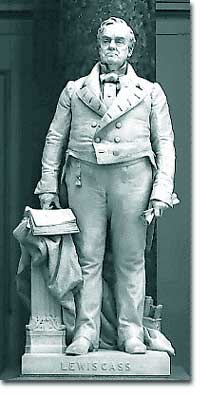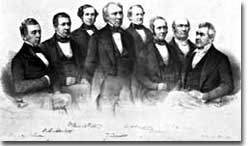30b. Popular Sovereignty

In the heat of the Wilmot Proviso debate, many southern lawmakers began to question the right of Congress to determine the status of slavery in any territory. According to John Calhoun, the territories belonged to all the states. Why should a citizen of one state be denied the right to take his property, including slaves, into territory owned by all? This line of reasoning began to dominate the southern argument. The Congress had a precedent for outlawing slavery in territories. It had done so in the Old Northwest with the passing of the Northwest Ordinance in 1787. The Missouri Compromise also had banned slavery above the 36º30' latitude lines. But times were different.
As the Mexican War drew to a close and no compromise could be reached in the Wilmot argument, the campaign for President became heated. The Democratic standard bearer, Lewis Cass of Michigan, coined the term "popular sovereignty" for a new solution that had begun to emerge. The premise was simple. Let the people of the territories themselves decide whether slavery would be permitted. The solution seemed perfect. In a country that has championed democracy, letting the people decide seemed right, if not obvious.

Although Taylor didn't advocate any position regarding slavery during his campaign, after his election he stated that California and New Mexico should be admitted to the union and should decide their status by means of popular sovereignty. Taylor's cabinet, shown here, had members of different sections of the nation with differing opinions on slavery.
However simple popular sovereignty seemed, it was difficult to put into practice. By what means would the people decide? Directly or indirectly? If a popular vote were scheduled, what guarantees could be made against voter fraud? If slavery were voted down, would the individuals who already owned slaves be allowed to keep them? Cass and the Democrats did not say. His opponent, Zachary Taylor, ignored the issue of slavery altogether in his campaign, and won the election of 1848.
As the 1840s melted into the 1850s, Stephen Douglas became the loudest proponent of popular sovereignty. As long as the issue was discussed theoretically, he had many supporters. In fact, to many, popular sovereignty was the perfect means to avoid the problem. But problems do not tend to disappear when they are evaded — they often become worse.






